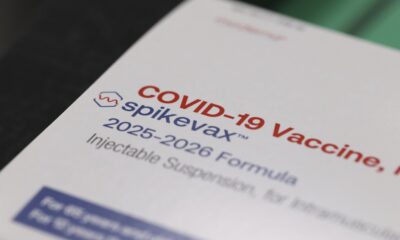Health
FDA-Approved Drugs Show Promise in Reversing Alzheimer’s Disease

Groundbreaking research has revealed that two FDA-approved drugs, previously used to treat cancer, have the potential to reverse the effects of Alzheimer’s disease and restore memory in mice. The findings, which provide new hope in the battle against this debilitating condition, were published in the journal Cell.
Researchers at the UCSF Bakar Computational Health Sciences Institute first identified how Alzheimer’s disease disrupts gene activity within brain cells. Utilizing the Connectivity Map database, which includes 1,300 FDA-approved drugs, they sought medications that could reverse Alzheimer’s-associated gene expression. From this analysis, they narrowed their focus to five candidates and ultimately selected two cancer treatments: letrozole and irinotecan.
In a simulated clinical trial, the team analyzed medical records from approximately 1.4 million patients. The data indicated that individuals who had been treated with letrozole or irinotecan for cancer exhibited a significantly lower incidence of Alzheimer’s disease. When these drugs were administered together in a model representing advanced Alzheimer’s in mice, they not only reversed gene expression changes associated with the disease but also dissolved toxic tau protein clumps and prevented further brain degeneration.
Most notably, the combination of letrozole—primarily used for treating certain types of breast cancer—and irinotecan, which targets colon cancer and small cell lung cancer, restored memory and learning capabilities in mice that had already exhibited severe Alzheimer’s symptoms.
Marina Sirota, the interim director of the UCSF Bakar Computational Health Sciences Institute, expressed excitement about the implications of their research, stating, “Alzheimer’s disease comes with complex changes to the brain, which has made it tough to study and treat, but our computational tools opened up the possibility of tackling the complexity directly.”
Yadong Huang, a professor of neurology and pathology at UCSF, emphasized the challenges inherent in drug development for Alzheimer’s, noting that the disease typically arises from multiple alterations in genes and proteins. This complexity has hindered traditional drug development strategies, which often focus on single targets.
The discovery of these potential therapies could significantly expedite the pathway to human clinical trials, given that both drugs are already FDA-approved for other conditions. Nevertheless, repurposing medications initially designed for cancer treatment poses certain complexities and risks that researchers must navigate.
This breakthrough adds to a growing body of research aimed at finding effective treatments for Alzheimer’s disease. Other promising studies have explored various compounds, including carnosic acid, derived from rosemary and sage, which has demonstrated the ability to reverse memory loss and alleviate brain inflammation in Alzheimer’s models. Furthermore, a study from Stanford Medicine indicated that seniors who received the shingles vaccine were 20% less likely to develop dementia over a seven-year period.
As research continues to evolve, the potential for these existing medications to provide relief for Alzheimer’s patients offers a glimmer of hope in a field that has struggled with effective treatment options.
-

 Technology5 months ago
Technology5 months agoDiscover the Top 10 Calorie Counting Apps of 2025
-

 Health2 months ago
Health2 months agoBella Hadid Shares Health Update After Treatment for Lyme Disease
-

 Health3 months ago
Health3 months agoErin Bates Shares Recovery Update Following Sepsis Complications
-

 Technology4 months ago
Technology4 months agoDiscover How to Reverse Image Search Using ChatGPT Effortlessly
-

 Technology1 month ago
Technology1 month agoDiscover 2025’s Top GPUs for Exceptional 4K Gaming Performance
-

 Technology2 months ago
Technology2 months agoElectric Moto Influencer Surronster Arrested in Tijuana
-

 Technology5 months ago
Technology5 months agoMeta Initiates $60B AI Data Center Expansion, Starting in Ohio
-

 Technology5 months ago
Technology5 months agoRecovering a Suspended TikTok Account: A Step-by-Step Guide
-

 Health4 months ago
Health4 months agoTested: Rab Firewall Mountain Jacket Survives Harsh Conditions
-

 Lifestyle5 months ago
Lifestyle5 months agoBelton Family Reunites After Daughter Survives Hill Country Floods
-

 Technology4 months ago
Technology4 months agoHarmonic Launches AI Chatbot App to Transform Mathematical Reasoning
-

 Technology3 months ago
Technology3 months agoUncovering the Top Five Most Challenging Motorcycles to Ride




















